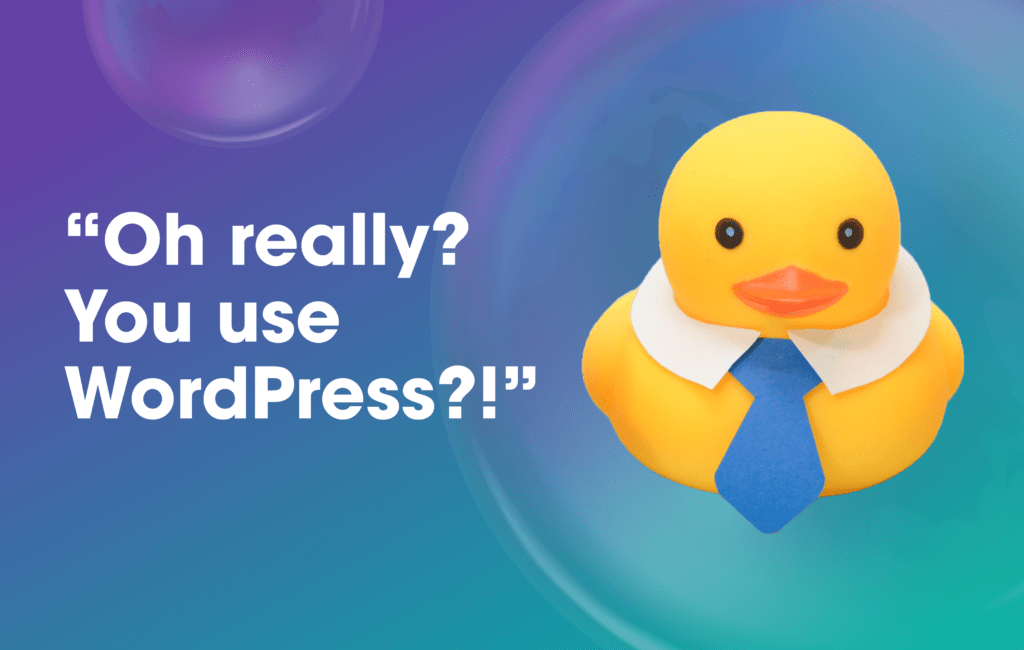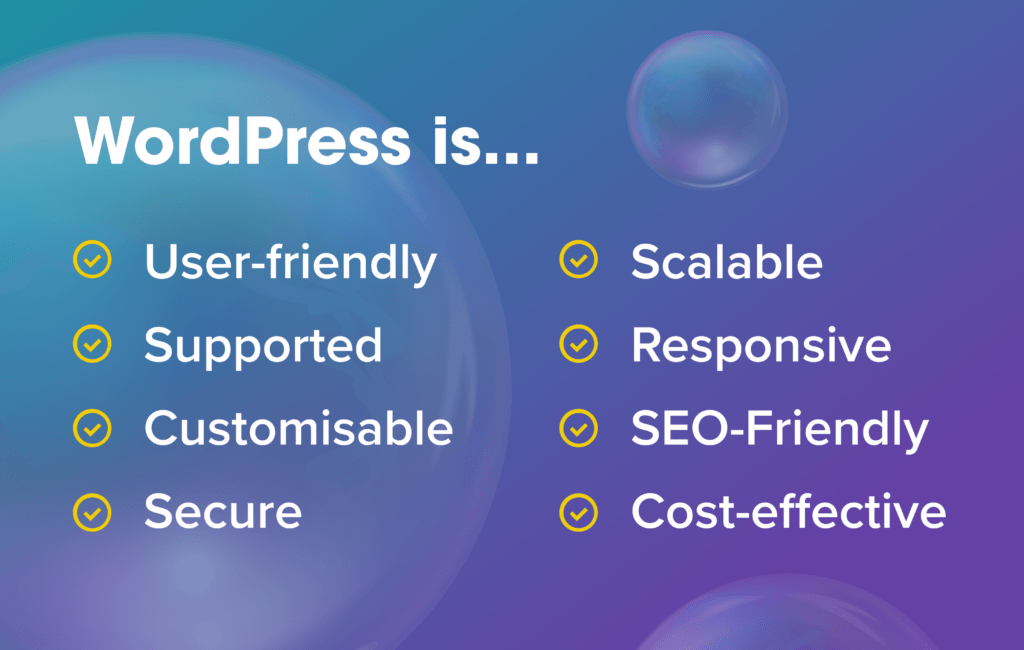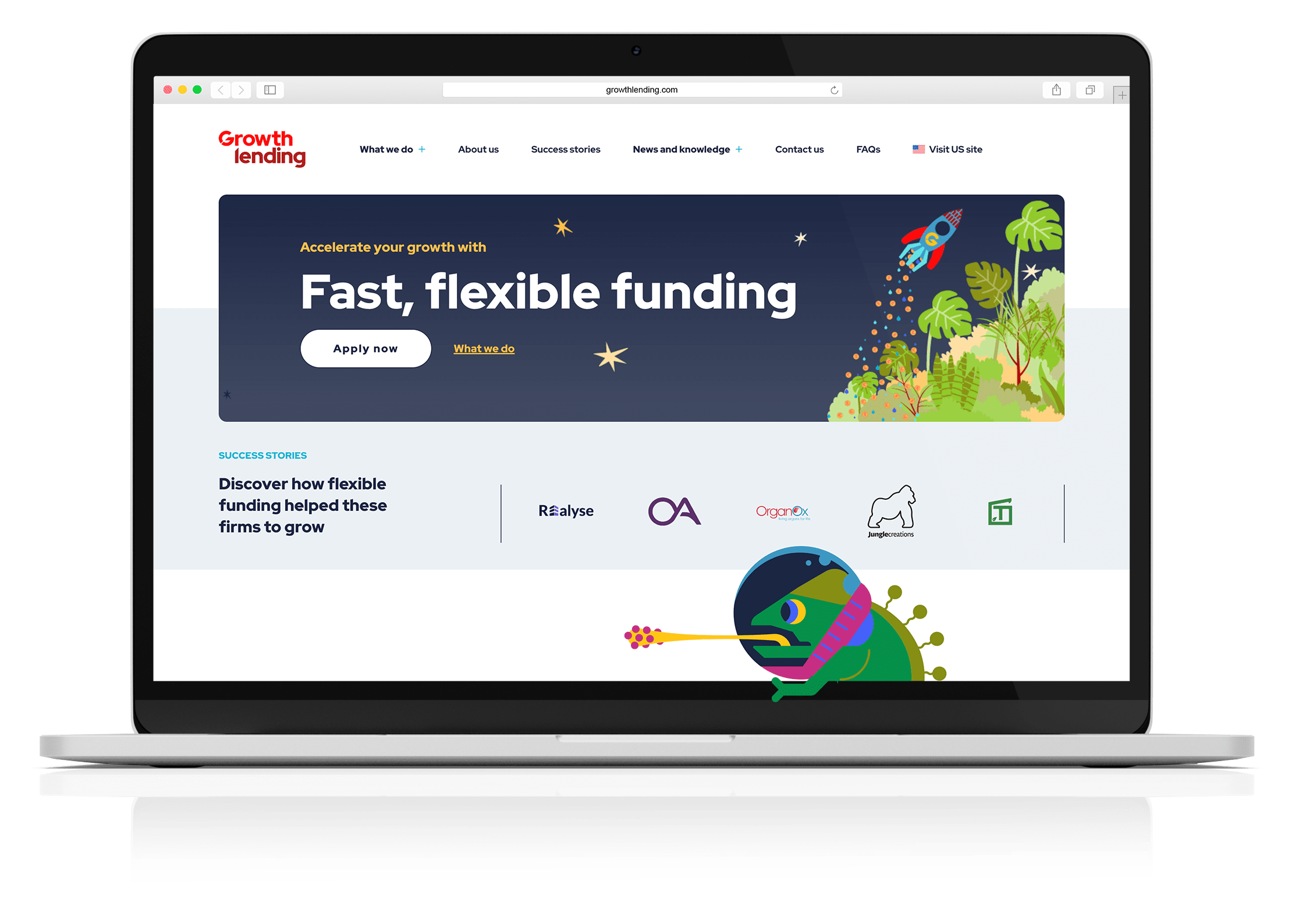WordPress is the most used content management system (CMS) in the world, and has been the fastest-growing CMS since 2014. However, have you ever wondered just how many websites use WordPress?!
WordPress Statistics for 2025
As of the latest WordPress usage statistics in January 2025, it was used for:
- 43.6% of website builds.
- 62% of the CMS market: more than 10x that of the closest competitor.
- Over 500 million websites in total.
- Over 30,000 themes (almost 13,000 of which are free).
- Over 70,000 plugins (59,000 of which are free).
- A market-leading 35.47% of e-commerce websites, as a result of WooCommerce.
It’s no longer the freshest WordPress statistic but it’s also worth saying that, just a few years ago in 2022, WordPress was being represented by 36.28% of the top 1 million websites.
TL; DR: WordPress is the most popular CMS in the world, and is our recommended CMS for the second year running because we find that it meets the needs of our partners. It’s open-source, adaptable, constantly-supported, scalable, great for SEO, secure, great for blogging, easy to learn, and easy to use, so there’s little wonder why a third of all websites rely on it.
With such impressive WordPress stats, writing an article that sings the praises of this powerful tool might seem a little redundant. After all, surely the numbers speak for themselves?!
Well, the other day we were speaking to someone who was enquiring about the prospect of a new website, and they passed a comment that got us thinking:

It’s not the first time that we’ve heard such a remark, but we suddenly realised that maybe the ubiquitous nature of WordPress is sometimes being interpreted as a sign of a platform that’s entry level. To some people, WordPress appears to be a decent building block to get you started, but could and should be moved on from when the opportunity presents itself.
If that’s a sentiment that resonates with you, we’re here to set the record straight:
WordPress is great, is becoming even better…. and should still be your CMS of choice in 2025!
We’re not saying that WordPress is the one, the only, and the best choice for literally every website, but it’s a far more powerful, versatile, and cost-effective solution than some would give it credit for. A wide variety of websites make use of it, which speaks volumes; it must be doing a lot right, and it really is a great platform for building websites of all shapes and sizes.
For example, what would you say is the common thread that unites the following websites?
- The White House
- The Walt Disney Company
- The Rolling Stones
- Forbes
- TechCrunch
- Sony Music
- WooCommerce
- Yoast
Given that this is a blog about WordPress it probably won’t shock you to learn that all of the above sites are built on that platform or use it as their CMS. But seriously, it’s still a pretty impressive list!
So, just why are all these websites using WordPress, and why should you seriously think of further investing in it during 2025?
What Benefits Are Behind the WordPress Market Share?

It’s User-Friendly
WordPress is perhaps the last word when it comes to balancing user-friendliness with the possibility of bespoke web development.
The interface of WordPress is very intuitive. At its core, it’s a CMS, so it’s designed to be used by bloggers and content creators, who can create, edit, and organise content to their hearts’ content. You don’t need to be a developer to use it well, even if you’re wanting to modify menus, plugins, and themes. As a result, you’re freeing up your developers to focus on the tasks that need their specialist skill set, and are saving time and money by not calling on them for relatively minor onsite changes. However, you’re also not sacrificing the potential of clever coding for something that’s restrictive in its simplicity.
It’s Customisable
One big reason why we say you’re not sacrificing clever coding is because WordPress is open-source. It’s freely available, and is a virtual sandbox when it comes to customisation.
Developers have nearly unlimited options when it comes to creating themes, templates, and plugins to extend the functionality of WordPress. As we pointed out at the start of this blog, there’s a vast ecosystem of WordPress plugins and themes, allowing you to change the functionality of a website or add new features with ease. This extends the platform’s capabilities and flexibility, making it suitable for various website types that range from blog posts to brochure sites, and even high-traffic enterprise and e-commerce online stores. It also means that your website can be tailored to your exact needs, whether that’s from a performance or UX perspective, or in terms of your branding. Your site can be whatever you need it to be.
It’s Scalable
A consequence of WordPress’s customisability, but well worth reinforcing: WordPress is suitable for both small personal blogs and large corporate websites. It can handle a high volume of traffic and content, so it’s a scalable solution. After all, just imagine how much traffic Forbes gets every day, or even our very own Blackpool Grand Theatre, where the high traffic loads from API bookings would strain a lesser CMS. You could start off small with WordPress and stick with it all the way as your business grows into an online giant, and you wouldn’t be stifling your potential at all! You’d simply need to add new features and content as your website expands and, without needing to resort to a drastic overhaul of your CMS, you can avoid some of the potential disruption to your traffic and keyword rankings that a start-from-scratch-rebuild might bring.
WordPress also works with any hosting provider that supports PHP and MySQL, which is a very convenient bonus.
It’s SEO-Friendly
Gone are the days when you could take shortcuts to the top of Google: strategic and long-term search engine optimization (SEO) is now a necessity, not an optional extra. WordPress is designed with SEO firmly in mind. It comes with clean code and a wealth of SEO tools right out of the box. The library of plugins (like the Rankmath plugin we use in our custom SUDS framework) can also help you to optimise your content for search engines, making it easier for your keywords to climb those search engine results pages. In turn, this makes it easier for new and existing customers to find you, potentially supercharging your sales. And, even when new benchmarks like Core Web Vitals are introduced, you can see that – despite being a glorious open-source sandbox – WordPress won’t rest on its laurels until it’s punching at the required weight.
It’s Supported
WordPress has a huge community of developers and users who are extremely active. Even the very best web developers will sometimes run into issues or need a second opinion. But, if you’re working with WordPress then you have a whole world of support at your fingertips in the form of forums, blogs, and even official support channels.
It’s Secure
No platform is immune to security threats and there will always be a need to keep your site up to date and use strong passwords. However, WordPress undeniably takes security very seriously and regularly appears on lists of the most secure platform options.
Part of the security that WordPress offers is down to the release of regular updates that are designed to address vulnerabilities and improve performance and functionality. However, there are also many security plugins on offer to boost your protection even more. This means your website will always be up to date with the latest web standards and technologies, minimising the risk of security breaches that can lead to costly downtime or remedial development work.
It’s Responsive
Google has been mobile-first for several years and the days of having separate mobile and desktop sites are largely gone. Ideally, you want your site to simply adapt to suit whatever device is being used to view it, as users are likely to leave right away if they encounter a clunky site. In other words, you want it to be responsive. Many WordPress themes include mobile responsiveness as a given, ensuring any website that uses them functions well on all devices and doesn’t encourage visitors to seek out competitors for the services they need.
It’s Cost-Effective
Using WordPress is cost-effective, especially for smaller businesses and individuals. The core software is free and you don’t have to pay licensing fees to build a WordPress site. Many themes and plugins are available free of charge as well. All these qualities help us to offer WordPress as our cheapest development option, with no loss to performance. We build on many platforms, but because even premium themes and plugins are more affordable than other forms of custom development, we can pass this saving on to you!
When it comes to it, you don’t have to think too hard about why WordPress is so popular. In fact, we could have probably spun up a list of far more bullet points if we’d have wanted to, but we thought eight was enough to be going on with!
Don’t get us wrong: WordPress isn’t perfect. For example, according to Search Engine Journal, WordPress still isn’t scoring too well for the recently-introduced Core Web Vitals metric, only managing a score of 32.52% in September 2023. However, that score has gone up by 7.13% since January 2022. That may not sound like a lot, but trust us, it’s a pretty rapid effort. Although it does have some negatives, switching to WordPress has helped a lot of businesses over the years, and that’s not going to change.
If you find WordPress to be lacking, you can also push the boat out to get it working both smarter and harder! In fact, we upgraded our SUDS framework in 2024, and have seen some great results as a result of that decision. For instance, our shiny new “SUDS 3” upgrade has taken the average desktop page speed scores of our new website builds to between 85 and 94, so they really couldn’t be much faster. One of the last sites we launched in 2024 even managed to score 81 for desktop page speed despite being very video-intense, which is fiendishly hard to accomplish. Some of this is also due to refinements that come down to the expertise of experience, such as adding third-party scripts on a case-by-case basis to avoid performance metrics being unnecessarily impacted.
Added to this, SUDS 3 has allowed us to cut our development times. Our asset-building of scripts and stylesheets has gone from 2 minutes to 4 seconds (yes, we promise you read that right!). This is a consequence of us implementing a more robust task runner, along with improvements to Tailwind v3. If you take WordPress – already a stellar CMS – and plug in the capabilities of a killer development team, you can get some seriously impressive results!
But what’s that, we hear you say?
If WordPress is so great and so helpful, why don’t we show you some of our most impactful WordPress projects?
We’re glad you asked!
(Some of) Our Favourite WordPress Case Studies

Growth Lending
After expanding their services, Growth Lending had ended up with three separate websites, and wanted to consolidate their online presence under one cohesive brand. We built them a WordPress site that was intuitive to edit within the CMS, and fully-responsive. It quickly began ranking for over 100 new keywords, with average engagement time per user rising by 57%.
Cheshire Community Foundation
We built Cheshire Community Foundation (CCF) a new WordPress site using our SUDS framework, allowing our designers to weave CCF’s collection of imagery into a fresh aesthetic and convey information in a way that’s easy to digest. The new process for their “Apply for Funding” section also let them manage applications at a much faster rate.
Blackpool Grand Theatre
The latest WordPress site we built for the Grand integrated with the API of Spektrix: the world-leading ticketing system. This enabled a deeper link between the website and booking system, and gave us the flexibility to achieve a world-first in the form of tailoring content to top interests. Resulting transactions soared by 21.83%, and revenue by almost 50%!
LMP Architects
The new LMP Architects build breathed life back into a web presence that was over 10 years old. It was also a showcase for the use of animations, so we had to put some safeguards in place to keep page speed high. This work was a huge success, leading to a 145% rise in organic traffic to their top pages, and an 80% increase in the number of first page keywords.
Claremont
The new Claremont website couldn’t have turned out much better. It’s sleek, professional, functional, and improves on its predecessor in almost every way. The content reads well, the technical issues were resolved, and the migration was as smooth as can be. Page speed also shot up by 153% on mobile and 88% on desktop, despite a lot of stylish video content being used.
Web Design & Development in WordPress
Hopefully, we don’t have to say too much more about why WordPress is justifiably one of the best CMS choices in the world, and looks set to remain so going into 2025. It’s:
- Open-source.
- Adaptable.
- Constantly-supported.
- Scalable.
- Great for SEO… and getting better.
- Secure.
- Great for blogging.
- Easy to learn.
- Easy to use.
But what about you?
Could WordPress be the solution to your website problem?
Over a third of all websites are already using it, so is it time for you to join their number and reap the rewards?
Given the advantages that WordPress brings to the table, you’re probably handing an advantage to your competitors if you hold out against a website redesign that’s badly overdue. The digital landscape is fast-paced and ever-changing, so you need a CMS solution that can endlessly-adapt to the challenge. In short, there’s a pretty strong chance that you need to invest in WordPress!
If your current website is in need of a fresh lick of paint, then our expert web design and development team can build you something that ticks all the boxes: distinctive visuals, fantastic performance, and a joy to use. Give us a call today, and we’ll scrub up your website until it shines above the rest!
